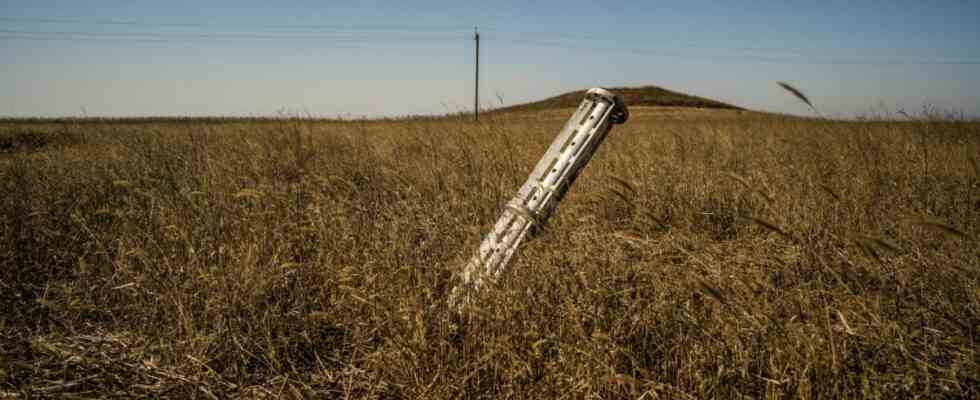The ground is wheat yellow, the sky is blue: the Ukrainian flag symbolizes the country’s fertility, and Ukraine is also known as the “granary of the world”. Your fields bring high yields, the next harvest is coming up soon. But this year the export routes are blocked, and millions of tons of grain are not reaching those who urgently need them. Also because this raw material is missing, food prices are rising worldwide.
Even at the World Economic Forum there is hardly a conversation that does not at some point deal with food safety, high prices and the threat of hunger. Economists and politicians present agree that the consequences of the Ukraine war could be catastrophic. From the perspective of the International Monetary Fund (IMF), there are two dangers that reach far beyond the region: an energy crisis and a food crisis. “The situation is desperate,” says the IMF.
According to Ukrainian data, 22 million tons of grain from last year’s harvest are currently stored, which cannot be exported at the moment, mainly because the port of Odessa is blocked by Russia. The new harvest is expected in the coming months. “If the stored grain cannot be exported by then, we will have to burn more than 20 million tons,” said Ukrainian MP Anastasia Radina. “That would be a disaster.” Ukraine is one of the largest wheat exporters in the world. According to Ukrainian information, 400 million people are supplied with grain from the country, especially in Africa and Asia.
Ukrainian President Volodymyr Zelensky spoke to the World Economic Forum on Monday: “Russia is stealing our grain,” he said. In fact, the Russian military is apparently deliberately bombing stocks in Ukraine. The consequences are visible to everyone, said EU Commission President Ursula von der Leyen in her speech in Davos. “It’s vulnerable countries and vulnerable populations that are hit hardest. Bread prices in Lebanon have risen by 70 percent and food from Odessa could not be shipped to Somalia.” Russia also hoarded its own food exports. “There is only one thought behind it: Russia uses hunger and grain to exercise power,” said von der Leyen.
So what to do? The Commission President believes that there are solutions: The EU is setting up corridors between Ukraine and European ports so that grain can be shipped. In addition, one increases its own production and wants to enable “endangered countries to be able to get the available supplies and additional goods at affordable prices”.
However, as everyone is aware, the war only exacerbates a problem that actually triggered the climate crisis. For example, Egypt, one of the major buyers of Ukrainian grain, produced its own food, von der Leyen recalls: “Climate change then led to water shortages, and hundreds of square kilometers of fertile land turned into desert – year after year.” For Egypt, the price of bread has now become a social problem. Experts fear that without imports and other subsidies, the people in the country would rebel.
Bread seller in Cairo: The country imports 80 percent of its wheat from Russia and Ukraine.
(Photo: Roger Anis/Getty Images)
The example shows how vulnerable previous solutions were and also that hunger was a permanent problem even before the Ukraine war. Even if this sometimes seems far away in oversupplied Europe. According to information from Unicef, the number of malnourished people has been increasing again since 2014, most of them living in Asia and Africa.
India, for example, is suffering from the heat. The country actually wanted to export wheat, but has now imposed an export ban because the harvest will be significantly smaller due to the drought. In Davos, the Kenyan climate activist Elizabeth Wahuti described the effects of climate change on food security: three million Kenyans alone are at risk of extreme hunger. “Just a week ago I visited a region in north-eastern Kenya and saw farm and wild animals dying there. But not only they, the local people are also suffering from hunger and thirst.” In Davos, she appealed to the participants, many of whom are billionaires, entrepreneurs and decision-makers in powerful institutions: it was inevitable to finally stop using fossil fuels.
In Davos, companies and politicians are visibly trying to show what they are doing to combat the climate crisis. An initiative by the US government’s climate commissioner, John Kerry, wants to invest a lot of money in the conversion of entire industries together with companies such as Microsoft, Alphabet and Salesforce and make it possible, for example, for aircraft fuel to do without fossil fuels in the future. The motivation for the initiative is not to alleviate hunger. But, and this becomes very clear in Davos: everything is connected.

